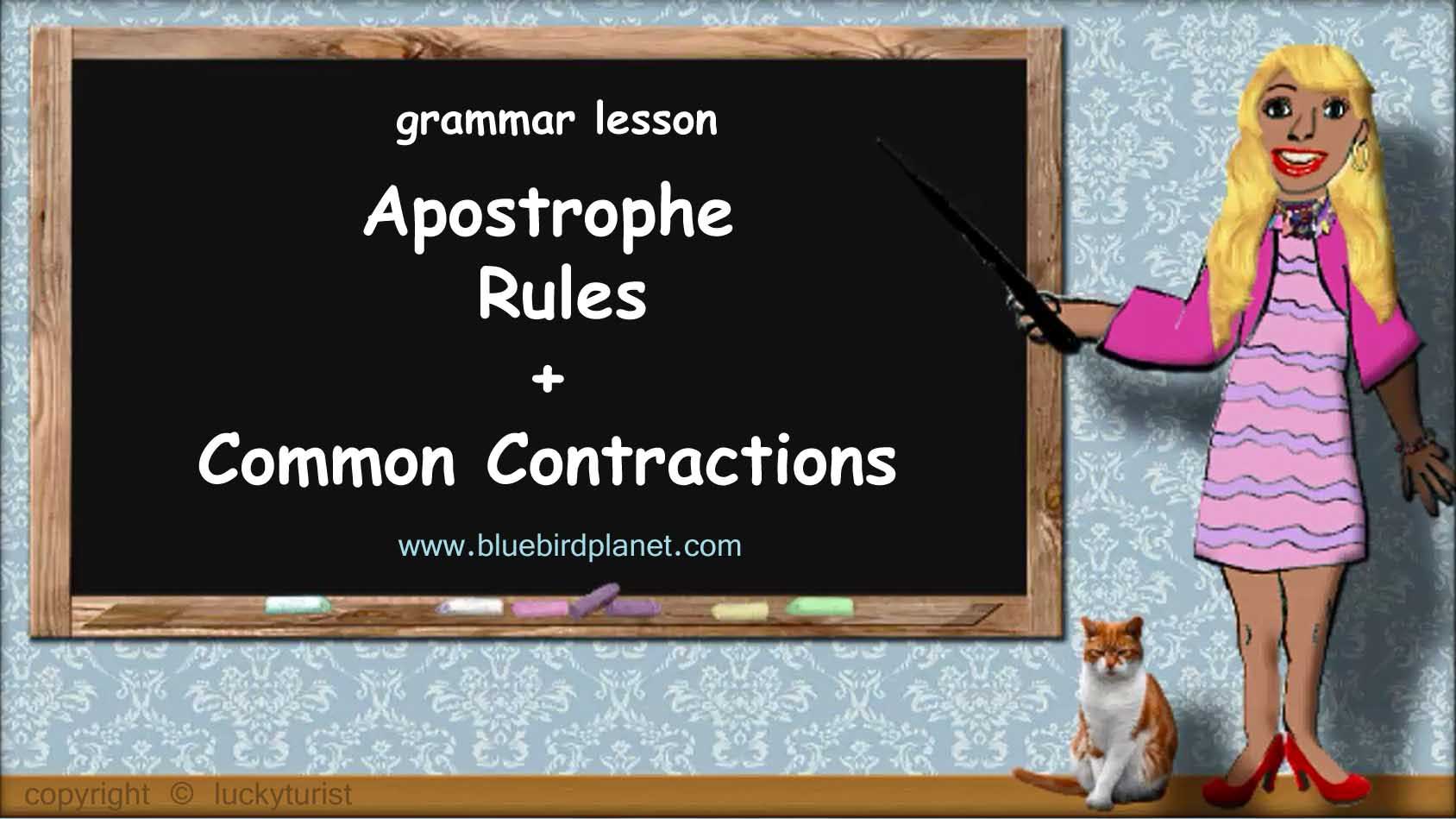Apostrophe Rules

Apostrophes in English serve two basic functions; they show possession, and they indicate that letters have been removed from the original words in the process of forming a contraction.
Apostrophe Rules for Possessives
When the possessor is single:
Use an apostrophe + s ('s) to show that one person/thing owns or is a member of something.
examples: Maria's ballet class, Maria's cats, Jack's car, James's dog, James's sports teams or James' dog, James' sport teams
It makes no difference whether the item owned is singular or plural. We use "Maria's" to say that the ballet class (singular) is hers and that the cats (plural) are hers.
Even if the name ends in "s", it is still correct to add an apostrophe + s ('s) to create the possessive form. It is also acceptable to add only an apostrophe to the end
of singular nouns that end in "s" to make them possessive. In this case, that means " James’ " would have the same meaning as " James’s ".
When the possessors are plural:
Use an apostrophe after the "s" at the end of a plural noun to show possession.
examples: the parents' bedroom, the girls' skirts
It is not necessary to add another "s" to the end of a plural noun.
Irregular nouns
If a plural noun doesn't end in "s" (children, feet, mice, teeth, women...), add an " 's " to create the possessive form.
examples: the children's rooms, the teeth's roots
correct: three children's toys (children + apostrophe + s)
incorrect: three childrens' toys
The plural is children, not childrens.
Remember, a possessive noun needs an apostrophe and an "s" at the end. If there’s already an "s" there, you can just add the apostrophe. If there's no "s", you
have to add both - first the apostrophe, and then the "s".
Possessive Plurals of Proper Names Ending in "s"
Things can get really confusing with the possessive plurals of proper names ending in "s", such as Hastings.
If you're the guest of the Ford family—the Fords—you're the Fords' guest (Ford + s + apostrophe). But what if it's the Hastings family?
Most would call them the "Hastings." But that would refer to a family named "Hasting." If someone's name ends in s, we must add -es for the plural. The plural of
Hastings is Hastingses.
To show possession, add an apostrophe.
correct: the Hastingses' dog (Hastings + es + apostrophe)
incorrect: the Hastings' dog
Compound Noun
With a singular compound noun (for example, mother-in-law), show possession with an apostrophe + s at the end of the word.
example: my mother-in-law's cat
If the compound noun (e.g., brother-in-law) is to be made plural, form the plural first (brothers-in-law), and then use the apostrophe + s.
example: my two brothers-in-law's kids
Plural Possessors- Joint or Separate Possession
If two people possess the same item, put the apostrophe + s after the second name only.
example: Jack and Monica's home
However, if one of the joint owners is written as a pronoun, use the possessive form for both.
examples: Monica's and my home, his and Monica's home
In cases of separate rather than joint possession, use the possessive form for both.
examples:
Jack's and Monica's homes are both beautiful.
They don't own the homes jointly.
Jack and Monica's homes are both beautiful.
The homes belong to both of them.
Apostrophe Rule for Contractions
When you combine two words to make a contraction, you will always take out some letters. In their place, use an apostrophe. The one exception to this rule is the
contraction "won’t", which is "will + not."
they + have = they’ve; are + not = aren’t; they + will = they’ll
| Common Contractions | |
|---|---|
| are not | aren't |
| cannot | can't |
| could not | couldn't |
| did not | didn't |
| does not | doesn't |
| had not | hadn't |
| has not | hasn't |
| have not | haven't |
| he had; he would | he’d |
| he will; he shall | he'll |
| he is; he has | he's |
| I had; I would | I'd |
| I will; I shall | I'll |
| I am | I'm |
| I have | I've |
| is not | isn't |
| let us | let's |
| might not | mightn't |
| shall not | shan't |
| she had; she would | she'd |
| she is; she has | she's |
| should not | shouldn't |
| that is; that has | that's |
| there is; there has | there's |
| they had; they would | they'd |
| they will; they shall | they'll |
| they are | they're |
| we had; we would | we'd |
| we are | we're |
| we have | we've |
| were not | weren't |
| what will; what shall | what'll |
| what are | what're |
| what is; what has | what's |
| what have | what've |
| where is; where has | where's |
| who had; who would | who'd |
| who will; who shall | who'll |
| who are | who're |
| who is; who has | who's |
| who have | who've |
| will not | won't |
| would not | wouldn't |
| you had; you would | you'd |
| you will; you shall | you'll |
| you are | you're |
| you have | you've |